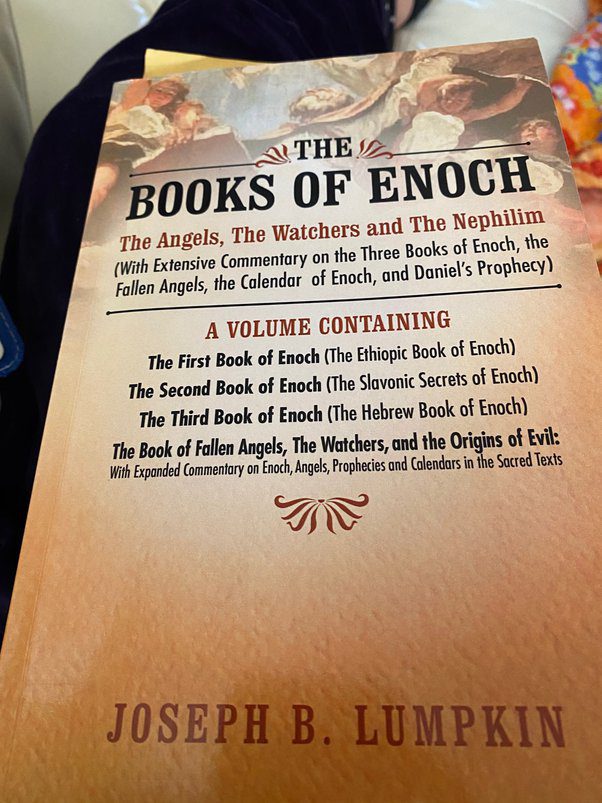Have you ever wondered why some ancient texts didn’t make the Bible? The Holy Scriptures we know today consist of 66 books meticulously assembled with divine guidance from prophets, shepherds, the nobility, and more. However, there are intriguing stories about other books that are never cut. One such enigmatic text is the Book of Enoch, a captivating piece that deals with various topics, including fictional writing about the end times.
This blog post will explore the mysteries surrounding the Book of Enoch and uncover why religious scholars and Christians distance themselves from it. From its forbidden allure to the imaginative characters it introduces, let’s embark on a journey to understand why the Book of Enoch remains a source of fascination for many.
The Facts About the Book of Enoch.
The Book of Enoch is a notable pseudepigraphical work, meaning it is not included in any canon of scripture. Its only complete extant version is an Ethiopic translation of a previous Greek translation made in Palestine. This ancient text contains apocalyptic accounts with visions and revelations about the end of times.
The book is divided into five sections, covering various intriguing topics. It explores the fall of angels, the origins of the Nephilim (commonly referred to as giants in the Bible), the reasons behind the great flood, astronomy, and other prophecies. Some of its writings are similar to the Book of Revelation in the New Testament, yet the Book of Enoch was not accepted into the Holy Scriptures like its counterpart.
The central theme of the Book of Enoch revolves around judgment for the wicked and blessings for the righteous, emphasizing the concepts of justice and divine retribution.
One of the reasons the Book of Enoch has gained immense popularity is its association with Enoch, the great-great-great-grandson of Adam. As mentioned in Genesis 5:22-24, Enoch lived a remarkable life, walking faithfully with God for 300 years. Exceptionally, Enoch was taken away by God and did not experience death.
The Book of Enoch remains a fascinating ancient text, intriguing religious scholars and enthusiasts alike, despite not being included in the recognized canon of scriptures. Its unique insights into apocalyptic visions and its connection to Enoch, a significant figure in biblical genealogy, continue to pique curiosity and spark discussions among those seeking to understand the ancient wisdom preserved within its pages.
Who was The Writer? and What was the Message of Enoch?
Enoch, the seventh patriarch of Genesis, was revered for his piety and later received secret knowledge from God. He is mentioned in several biblical stories as Noah’s great-grandfather, the patriarch before the flood, son of Jared, and father of Methuselah. According to Genesis Book, Enoch lived for 365 years before ascending to Heaven, taken by God.
Enoch is believed to be the author of the Book of Enoch, one of the oldest religious texts describing God’s judgment. The book is divided into six parts, each presenting unique stories about Jesus, angels, and the fate of humans. These sections include ‘The Book of Watchers,’ ‘The Book of Parables,’ ‘The Book of the Heavenly Luminaries,’ ‘The Dream Visions,’ and ‘The Epistle of Enoch.’
While not all parts of the Book of Enoch necessarily contradict the Christian faith, there are instances and events in the book where God, Jesus, and angels are portrayed in ways that do not align with traditional conceptions of their divine nature. As a result, these elements contributed to the book’s exclusion from the biblical canon and its status as an apocryphal work.
Why Stay Away From the Book of Enoch?
The Book of Enoch, with its enigmatic charm and ancient origins, has captivated the imagination of many. However, it’s essential to recognize the reasons why caution is advised when delving into its contents, especially from the perspective of religious study and interpretation. Here are some factors to consider:
- The Book’s Appeal and Divinity:
The Book of Enoch’s allure can be traced back to its discovery in the Dead Sea Scrolls, long before Jesus Christ. Despite its popularity, it’s important to remember that popularity alone doesn’t equate to divine inspiration. While fragments of the book were found alongside biblical texts, the presence of non-biblical writings raises questions about its divine origin. The Christian church’s canonization process was meticulous to ensure that only texts truly inspired by God were included in the Bible.
- Historical and Cultural Significance:
The Book of Enoch, attributed to Enoch, Noah’s great-grandfather, holds cultural and historical importance. It’s quoted in Jude and provides insight into early Jewish and Christian thought. However, its non-canonical status means it lacks religious authority for guiding faith and practice.
- Caution with Non-Canonical Works:
Non-canonical texts, like the Book of Enoch, occupy a space outside religious traditions. While they may hold historical and cultural value, they don’t carry the same weight as recognized sacred writings. If seeking spiritual guidance, authoritative texts should prevail.
- Addressing Controversial Subjects:
The Book of Enoch delves into subjects like fallen angels and celestial-human unions, which challenge established scientific and anthropological understanding. This can lead to skepticism and concerns about its compatibility with established teachings and beliefs.
- Purpose and Alignment with Scripture:
Unlike canonical scriptures that teach fundamental truths and provide guidance for life, the Book of Enoch was crafted with specific historical contexts in mind. For instance, certain sections were likely responses to issues within the early Jewish community, rather than attempts to convey universal spiritual wisdom.
- Historical Rejection by Christianity:
While early Christians knew the Book of Enoch, its non-canonical status was established over time. Major Christian branches like the Roman Catholic Church and Eastern Orthodox Church, as well as various Protestant traditions, consider it non-canonical. Only a couple of Ethiopian Orthodox churches include it in their canon.
- Fragmentation and Authenticity:
Scholarly research has revealed that the Book of Enoch is a compilation of texts authored by different individuals over centuries. This fragmented nature challenges its authenticity and cohesiveness. Discrepancies in manuscripts and missing sections contribute to ongoing debates about their origins and meaning.
Balancing Intrigue with Caution: While the Book of Enoch offers insights into ancient thought and beliefs, it’s vital to approach it with balanced caution. Acknowledge its allure while recognizing its non-canonical status, historical context, and potential for controversial interpretations. To deepen spiritual understanding, focus on recognized canonical texts that have stood the test of time and continue to inspire faith and practice.
The Book of Enoch – An Intriguing But Controversial Ancient Text
The Book of Enoch has fascinated readers for centuries. As a non-canonical Jewish religious work of disputed origins, it provides a glimpse into obscure ancient texts and beliefs. However, controversy surrounds the Book of Enoch, leading most scholars and religious groups to approach it with caution.
A Work Shrouded in Mystery
The Book of Enoch is an ancient Jewish religious writing ascribed to Noah’s great-grandfather Enoch. It is not part of the biblical canon used by Jews or Christian denominations. The exact origins of the Book of Enoch are unknown. Portions may have been composed as early as 300 BCE, with additional sections added later. Only the Ethiopian Orthodox Church accepts Enoch as canonical scripture. There are multiple versions of manuscripts, with parts discovered in the Dead Sea Scrolls. This indicates a complicated compositional history rather than a single coherent book.
Early Intrigue and Eventual Rejection
In earlier centuries, the Book of Enoch garnered attention due to its reference in the New Testament’s Epistle of Jude. Early church leaders like Tertullian considered it scripture. But later Christian thinkers analyzed the Enoch texts more critically. They deemed it non-canonical once they became aware of its unusual contents on topics like giants, fallen angels, and angel/human hybrids. These controversial elements were seen as contradictory to Christian teachings and scientific facts. Major branches of Christianity ultimately rejected the Book of Enoch as inspired scripture.
Caution Advised When Reading Enoch
While the Book of Enoch offers fascinating glimpses into obscure ancient Jewish texts, scholars urge caution when consulting it. Reasons include:
- Non-Canonical Status – Excluded from the biblical canon, Enoch lacks religious authority
- Questionable Historical Accuracy – Origins span centuries, raising doubts about reliability
- Does Not Align with the Bible – Enoch addresses specific ancient issues rather than teaching biblical truths
- Disproven and Fragmentary Nature – Multiple versions and missing sections challenge authenticity
An Intriguing but Puzzling Ancient Work
In the end, the Book of Enoch remains a perplexing work viewed as non-authoritative by modern religious groups. While intriguing, it’s compositional history and controversial contents are at odds with mainstream biblical teachings. The Book of Enoch is best approached as an ancient religious text that opens a window into obscure Second Temple-era Jewish writings. But caution and scholarly analysis are warranted when evaluating its historical claims.
Is the Book of Enoch Connected with the Bible?
The Book of Enoch is not officially connected to the Bible used by most Jewish and Christian traditions. It is considered doubtful and pseudepigraphical, containing religious texts that revolve around Enoch, the great-grandfather of Noah.
The book discusses the fall of angels, known as the Watchers, and their request for Enoch to intercede on their behalf with God. Its transcribers mentioned their intention to explore Christianity beyond the official Bible.
The Book of Enoch presents a narrative involving ante-diluvial giants and their rebellious fathers, the Watchers, who engaged in improper relationships with human females, resulting in corrupt offspring. Despite being outside the biblical canon, it is suggested that Jesus, at some point, read and accepted the faith described in the book, inspiring him to help humanity.
The book, however, contains controversial and ethically problematic elements, including immoral behavior attributed to angels, humans, and even God. As a result, many religious traditions consider it unsuitable for inclusion in the official Bible.
While the Book of Enoch is part of the Ethiopian Christian Bible and recognized in some cultures, it is not universally accepted as canonical scripture. It remains a topic of debate and discussion among scholars and religious communities.
Bottom Line
There are several compelling reasons why caution is advised when considering the Book of Enoch. Firstly, it is not part of the biblical canon recognized by most Jewish and Christian traditions, meaning it lacks inspired scripture authority and status. Additionally, its historical accuracy has been questioned, with scholars suggesting that it may be a collection of writings by different authors from various cultural backgrounds.
Furthermore, some portions of the book present controversial and ethically problematic content. These portions portray angels, humans, and God in ways that contradict traditional theological understandings. Such elements have led to its exclusion from the official Bible and classification as an apocryphal work.
While the Book of Enoch may be of historical and cultural significance, seeking spiritual guidance and understanding from recognized biblical texts is recommended for those seeking a solid foundation of faith. The richness and wisdom found in the canonical scriptures have endured time. They continue to serve as reliable sources of spiritual insight for countless believers. As with any ancient text, critical discernment and adherence to established religious teachings are essential in navigating the complexities of religious literature. This is to foster a deeper understanding of one’s faith.
Frequently Asked Questions
Is it a sin to read the Book of Enoch?
No, reading the Book of Enoch is not a sin, as individuals can read any text they desire. However, due to its controversial status and rejection by mainstream Christianity, it is advised to approach it with discernment and wisdom.
What did Jesus say about the Book of Enoch?
There is no record of Jesus directly quoting the Book of Enoch. While some claim references in Matthew 22:29-30, these passages are unrelated to the Book of Enoch. Jesus often provided new revelations in his teachings but no explicit endorsement of the book in the New Testament.
Where in the Bible is the Book of Enoch quoted?
The Book of Enoch is believed to be referenced in the Book of Jude (Jude 14-15). However, the extent of its influence on Jude’s writings is a subject of debate among scholars.
Is the Book of Enoch mentioned in the New Testament?
Yes, the Book of Enoch is indirectly referenced in the New Testament through the Book of Jude. However, this reference alone cannot validate the book’s inclusion in the biblical canon.
What did God promise Enoch?
According to the Book of Enoch, God promised Enoch that He would never flood the world again. Additionally, God pledged to call upon the children of Noah, inviting them to accept the gospel.
Who is the Messiah in the Book of Enoch?
The Book of Enoch describes a messianic figure known as the “Son of Man” with divine attributes. This messiah is expected to play a pivotal role in the final judgment and sit on the throne of glory.
What does the Book of Enoch say about Heaven?
The Second Book of Enoch describes multiple heavens, totaling ten in number. The writer uses various forms of description to elaborate on these celestial realms.
Are there hidden secrets in the Book of Enoch?
The Book of Enoch contains abundant symbolism and challenging language, making it difficult to understand without scholarly help. The text’s complexities have led to the search for hidden meanings and interpretations.











